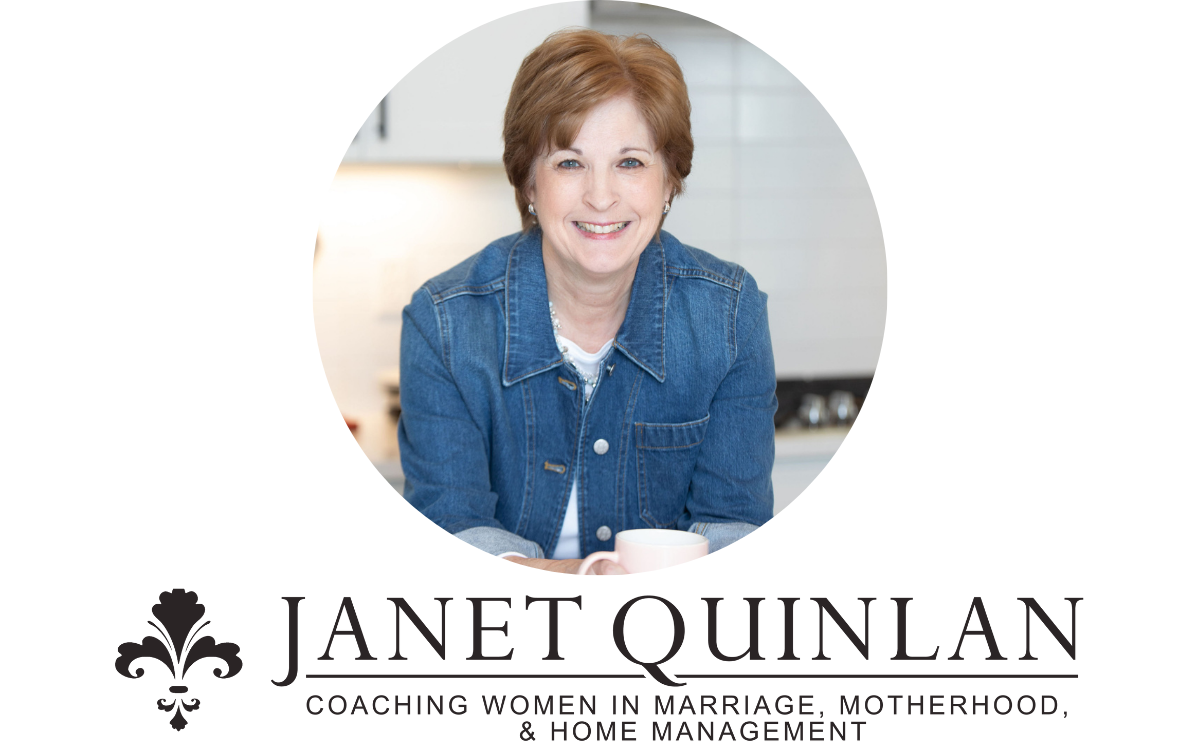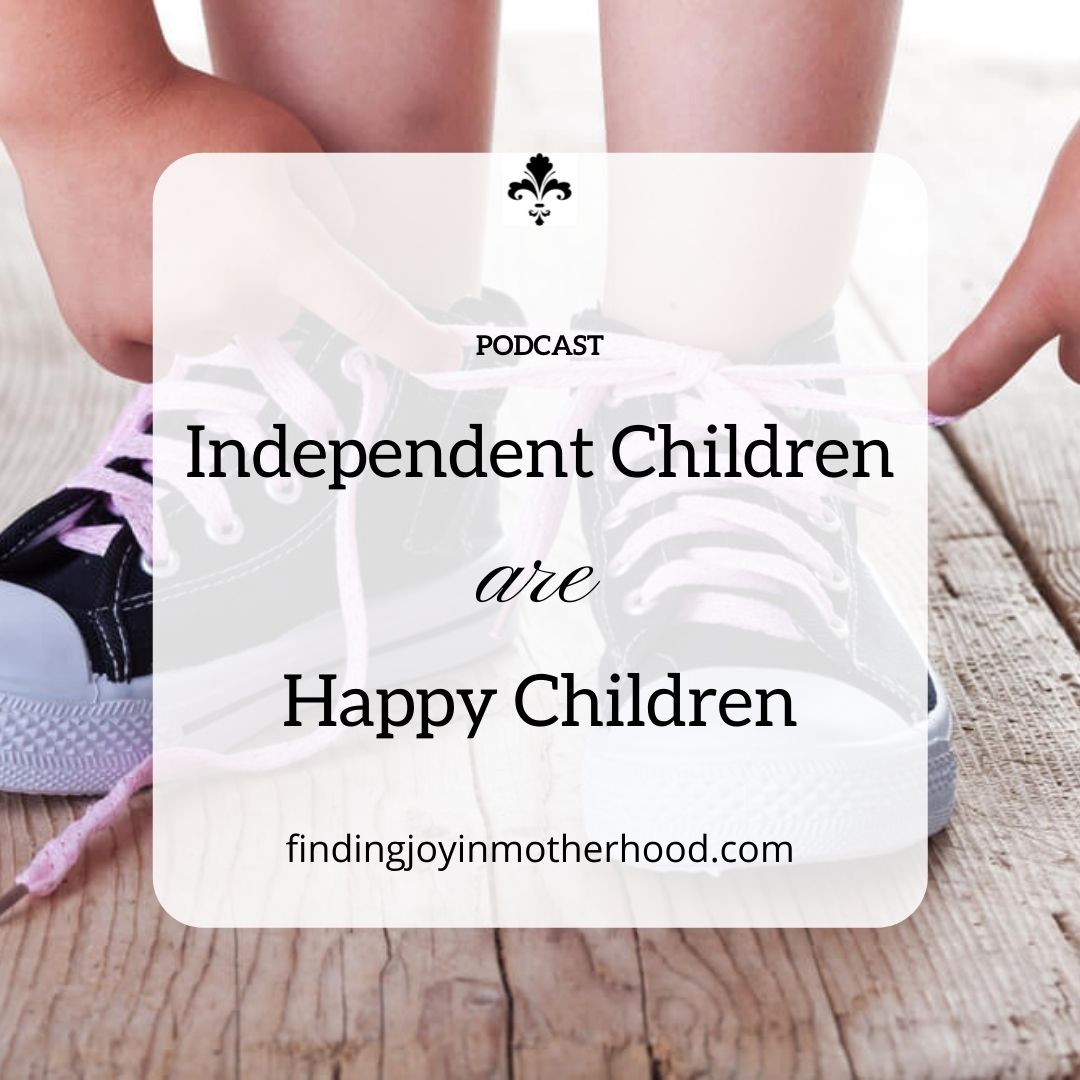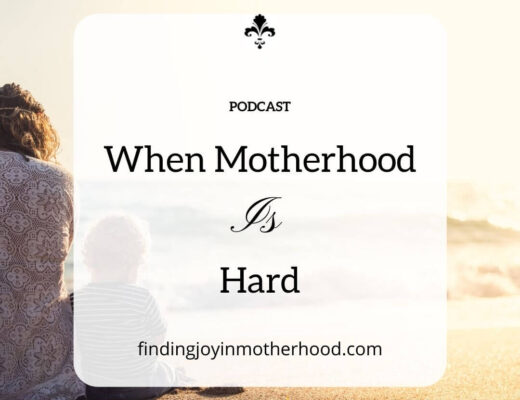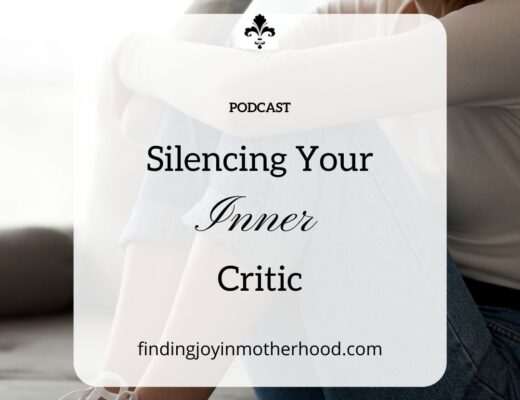Notes from This Episode:
For the age appropriate chore chart mentioned in this episode, click HERE
When children are independent, they don’t depend on anyone else for their happiness.
They are content with who they are. Independent children know their strengths and weaknesses, and they have the courage to be themselves.
Our primary job with our children is to give them the tools to become independent adults.
What are your thoughts about that?
“I need to do it for them.”
“My children can’t do it on their own.”
“She don’t know how.”
“They need me.”
“Being a good mom means I do things for them.”
“They can’t do it – they’re not old enough.”
While it is true that sometimes they’re not old enough to take on certain responsibilities or they don’t know how to do something to take on the independent action, we usually error on the side of keeping our children dependent on us – rather than giving them the tools to learn skills that will create independence.
Don’t forget our actions will always come from what we think and feel.
So, if you want to hold on to your children and keep them dependent on you because you think that’s what a mother does or because you don’t want to let go of those good snuggly baby vibes, you are, in fact, creating dependent, immature children and adults and you’ll wonder why your teenagers act entitled or make irresponsible decisions – you have taught them to do that.
You haven’t gently – over time – taught them to think and act for themselves.
So much of my coaching is to give moms the tools they need to give to their children to grow into happy, well-adjusted, responsible adults.
You don’t need to tell them…they already know.
Whatever is going on in our own head as mom, the children will quickly adopt as their own thoughts and feelings.
If you think your child can’t do it on their own, your child will quickly learn they can’t do it on their own. You don’t even need to say anything.
They pick up what you think and make it their own belief about themselves.
This is why I’m so convinced that coaching helps mothers be good and great mothers. It teaches us how important – really critical – it is to identify and be aware of our own thoughts about our children, our husband, or our abilities to keep a home.
Because what you think will be your result.
When I was teaching, I would sometimes find parents who ‘helped’ their children with their homework – they didn’t actually help, they did their children’s homework.
And you know what would happen when I questioned the student? They would tell me the truth and when I asked why their parent did their homework, they would say, “Because I can’t.” “I’m not smart enough.”
It broke my heart because those kids were smart enough. Maybe it wasn’t easy, or they had to work a little harder to do the work, but before they reach adolescence, their belief system is set in place “I’m not smart enough.”
Establishing the belief that “I’m not smart enough” is a fact.
Assuming they live to be 80, 10 years of their life decides the other 70 years. The story they are sold about themselves in this small amount of time in their life is the story they believe for the rest of their life.
It’s the story that stops them from being brave and trying new things.
They become the beliefs that prevent them from aspiring to great and noble accomplishments.
The story of “I can’t” is in their brain always telling them they can’t – they can’t trust themselves, they can’t trust others, they aren’t good enough.
Just to be clear – I’m not talking about freedom.
Freedom is about eliminating restrictions. And with freedom, always comes a balance of responsibility.
I’m talking about nurturing independence so that our children can be entrusted with freedom because the virtues they develop in practicing independent behavior allows them to develop a sense of responsibility.
And responsibility means being able to answer for one’s conduct and obligations
It’s having the ability to choose for oneself between right and wrong.
Giving our children the tools to become independent sets them up to become responsible.
I’m also not talking about a false independence.
This isn’t about letting your children make all the decisions of their life without the clear guardrails of developmental abilities, like allowing them eat whatever they want whenever they want or telling us they don’t want to take baths and we comply with their demand.
It’s also not about enabling them to keep their room like a pigsty rather than teaching them the habits of keeping a room neat and tidy.
Don’t mistake lapse parenting or permissive parenting for authentic teaching of the skills of independence.
When you allow your children to have a tantrum and get their way you’re not teaching independence – you’re teaching them that acting like a spoiled brat gets their way.
Independence is taught – it is not indulged.
It’s helping your children with life skills and demonstrating logical thinking so that they can take care of themselves.
For the age appropriate chore chart mentioned in this episode click HERE
Areas to teach independence
Self- Care
Keeping their living space clean
Dressing themselves
Guide with few options
Daily/Weekly Chores
Playing by themselves
Creating their own play
Making their own breakfast/lunch
Encouraging them to introduce themselves to others – to say hello to other children, to give them questions to ask to get to know other kids.
Schoolwork
Musical Instruments or learning a new skill
How to teach independence
We teach our children to be independent by first giving them clear routines or schedules and expectations. Don’t give them a closet full of clothes at 3 yrs old and say, “pick out what you want to wear.” Help them get dressed and at about 2 or 3 begin to teach them how to dress themselves.
It’s important to provide them with clothes and shoes that are EASY for them succeed in dressing themselves – seriously what’s up with these clothes manufacturers who are all about cute but not about practical – buy practical clothes for your young children so they can dress themselves without any help from you.
And give them limited choices. “You can wear this or this – which do you choose?” They’re not mature enough to choose from a huge variety of choices.
As they grow, they can begin to choose their own because you have taught clear criteria on how to choose.
Video Games/ Phone and social media surfing create babies that need babysitting.
The tech is the babysitter and you’re taking away valuable time in the day for your child to learn the skill of independence.
What is our primary job?
As mothers, our primary job is to teach our children. Teaching never involves shame, embarrassment or anger.
If you think about the best teacher you ever had, (Miss Heil in 3rd grade or Mr. Hoerr in 5th grade) I would guess they were someone who had clearly communicated criteria for you, who did not indulge your selfishness or immature behavior, and who encouraged and praised you.
THAT’S THE KIND OF TEACHER – MOM – YOU NEED TO BE.
Will you always be perfect?
No – but make becoming that kind of teacher (one who instructs, encourages, and praises while also holding your children accountable for their actions) your goal and that’s who you’ll become.
When we teach them to become independent, we teach them the virtues of industriousness, orderliness, responsibility, moderation, justice, perseverance, sociability and humility.
Have I convinced you yet???
When we teach our children to become independent, we’re teaching them so much more than just the skills of taking care of themselves.
We’re nurturing their self-esteem because children who can do for themselves, believe and trust themselves will develop confidence in who they are and satisfaction with their true self and their own self-worth.
We create happy, confident, brave, calm children who are problem solvers not children who sit and say, “I can’t.”
They will become adults who aren’t anxious or afraid to take chances – because they took chances at a young age – maybe they didn’t succeed all the time, but we were there to say, “Great try, try again!”
And when they try again and succeed, they will continue to try again in everything.
Independent children are happy children.




No Comments